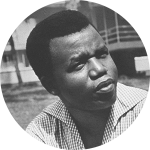Memory & Form
Hello Deep Readers,
Welcome to week three of our four-week exploration of Yaa Gyasi’s Transcendent Kingdom. Catch up on week one and two.
This week, we hosted our Faculty Salon with Chancellor Larive, Vilashini Cooppan, and Gina Athena Ulysse. As expected, the conversation was compelling and deep. It was great to see so many Deep Readers in person, and we appreciated the great questions from the audience online as well. You can watch the video of the Salon if you missed it.
We close the book on this year’s Deep Read on May 15 at the Quarry Amphitheatre where we’ll host Yaa Gyasi in conversation with UC Santa Cruz Professor Emerita of Literature Karen Tei Yamashita. Grab your FREE ticket today!

Forms of Memory
Today, we explore Transcendent Kingdom with the help of Vilashini Cooppan, UC Santa Cruz Professor of Literature and Critical Race and Ethnic Studies. Prof. Cooppan is especially interested in memory, trauma, and the “afterlives of historical events,” how traumatic experiences inform memory and shape individuals, communities, cultures, and histories, particularly the history of race and colonization. She thinks a lot about how we can bring these historical legacies of trauma to our analysis of literature. She’s also interested in histories of diaspora–the movement, or “dispersion,” of groups of people from one place to another who carry their cultures, languages, belief systems, and family histories with them, while also being subject to new and sometimes unfamiliar and involuntary transformations.
Prof. Cooppan’s approach echoes the novel’s concerns and reflects her own personal experience. She was born in South Africa during the Apartheid period, the era of systematic racial segregation and discrimination between 1948 and the election of Nelson Mandela as President in 1994. She says this about her upbringing:
I was placed within the world of Apartheid in a complex way as an Indian in South Africa, a country composed of a majority of Black Africans, White Africans, so-called Colored or mixed individuals, and a small population of Indians—small within the larger frame of South Africa, but the largest population of Indians outside of India. I grew up having a relationship to South African history that was both present and absent, because my family immigrated when I was very young and lived all over the world. So, I’m interested in how we carry our identities with us, how they get reproduced, and what the haunting residues and recurrences of our past are. And that’s especially true when we’re thinking about these histories of racialized nations. For example, I, in some ways, think of myself as an African.

This experience informs how Prof. Cooppan (pictured on the left) thinks about literature, especially novels that engage with both large-scale histories and smaller-scale personal stories at once. With Transcendent Kingdom, she highlights how history as well as time can be contained within intimate, personal details, such as a specific childhood memory. For example, we see this in the opening of the novel when Gifty describes one of the effects of her mother’s mental illness: “For months on end, she colonized the bed like a virus, the first time when I was a child and then again when I was a graduate student” (3). Here, Prof. Cooppan notes, we have a depiction of her mother’s depression on a very intimate scale in the form of her daughter’s memory of a time that was rooted and specific but that also happened again and again; we have both specificity in time and repetition across time, which gives us a sense that Gifty is haunted by this image of her mother and the cycle of her depression, even as she is trying to make peace with this memory and understand the loss of her mother and the nature of her illness.
While this description reveals a very specific, personal experience of trauma, memory, and loss internal to the novel, it also speaks to broader historical experiences of trauma and loss, which we can see in Gifty’s statement that her mother “colonized the bed like a virus.” As Prof. Cooppan explains, “that intimate detail has as its backdrop the larger history of colonization, and, in this brief phrase, it produces the entire historical world of the novel, which is, of course the British colonization of Ghana, and, even beyond that, the larger European colonization of the continent itself.” This theme keeps coming back again and again—the personal legacies and traumatic memories that are lasting wounds, but also a part of a broader historical context of the trauma of colonization and racism.

Colonization and the Novel Form

Thinking about colonization and the novel, Prof. Cooppan suggests that it’s helpful to think about the broader literary context of Transcendent Kingdom and what it means for the African novel to come into being. The Nigerian novelist Chinua Achebe (pictured on the right)—who is perhaps the godfather of the African novel—wrote in the 1950s and 1960s right around the period of decolonization and independence. He said that what’s interesting about the novel form is that you can do things with it, meaning that it’s not a fixed, inherited form. The novel form itself transforms as a result of African contexts and the legacies of colonial history. One of the crucial questions in African literature, for instance, has been whether to write in the language of the colonizer—English, French, Portuguese, Dutch or Afrikaans—or not. The novel form itself, then, becomes a potential site of decolonization and the struggle for independence.
This historical importance of the novel form is something to consider when Gifty expresses her desire for stories about her family and her own childhood. In one such example, she says: “By the time I wanted to hear the complete story of why my parents migrated to America, it was no longer a story my mother wanted to tell” (26). Without a definitive family story, Gifty resorts to “spinning elaborate lies to classmates about how [her] grandfather was a warrior, a lion tamer, a high chief” and how she, herself, is “actually a princess” (26). Gifty notes, though, that her stories of African warriors and princesses were met with disbelief because they ran contrary to common images of Africa at the time, as a place filled with “people stricken by war and famine” (27). Prof. Cooppan sees this as an important moment in the structure of the novel:
It reminds us that our access to something like the African novel is a filter between us and the reality of Africa. Media representations of Africa and popular and classic literary representations of Africa create a place without history, frozen in time, or completely eradicated by the negative experiences of colonialism. Gyasi’s novel is pointing us toward another kind of story, even though it is one that Gifty herself cannot get from her mother or even really fully construct herself when she goes to Ghana for a summer. The Africa she finds is not home, nor is the United States, structured as it is by the racist responses of her childhood Alabama church to her brother’s basketball career and struggle with addiction, and the experience of being the only Black woman in her neuroscience lab. Gifty, like the novel, moves between worlds, between times, between identities as she struggles to piece herself together.
To be a diasporic writer, like Gyasi, is to have a view from the outside looking in. As an immigrant, she writes as somebody who’s located in the US, but she also writes as someone connected to Africa. This creates space for the reader to have a similar experience, what Prof. Cooppan calls “an oscillation, a back and forth between being situated in a place but also seeing it through the eyes of another.” One of the real gifts that the form of this novel gives us is its oscillation of perspective, which provides a richness to our reading experience.
This multi-perspective, oscillating character of Transcendent Kingdom reminds Prof. Cooppan of an influential Ted Talk by the Nigerian novelist Chimamanda Ngozi Adichie called “The Danger of a Single Story,” which cautions us to be on guard against simplistic, one-sided narratives.
For example, Transcendent Kingdom resists the dangers of a single story, or one, reductive explanation for complex phenomena, in the ways it stages the interplay between religion and science. Gifty’s narrative early on recalls that she “had traded the Pentecostalism of [her] childhood for this new religion,” her neuroscientific research on addiction (21). The form of the novel, however, makes no such trade; instead, it gives us in rich and complex detail both the story of science and religion. Time and again, it asks us to hold both stories together, to see what she calls an “ambiguity” linking those distinct beliefs, quests, and worldviews (132). If Gifty characterizes herself as having “given that organ [the brain] a kind of supremacy, believing and hoping that all of the answers to all of the questions that I have can and must be contained therein,” the novel gives us many more questions than answers (77).
Transcendent Kingdom, as Prof. Cooppan explains, invites us to look again and again at what we think we know, say a certain image of Africa or of the African experience in America. It asks us to oscillate between two different ways of posing questions about what we know and how we know it, the “stories” of religion and the “stories” of science, which are interwoven in the novel. The novel’s composition of a narrative that moves back and forth between science and religion, as it also moves between America and Ghana, the past and the present, the suppressed story of Gifty’s mother and the story of Gifty and Nana, yields an oscillating, shifting form. This form allows us as readers to grasp something that Gifty expresses, that “this tension, this idea that one must necessarily choose between science and religion, is false” (213).
Go Deep
Taking up some of Prof. Cooppan’s interesting concluding insights, why do you think Gifty claims that choosing between science and religion is “false”? What does this mean exactly, and how is Gifty encouraging us to think about the relationship between tensions such as religion and science in the novel? What other issues does the novel want us to revisit and rethink, and why, ultimately, is the novel asking us to do this? What do you think we’re supposed to gain from these critical reflections? Speaking to some of Prof. Cooppan’s earlier points, do you see other places in the novel where Gifty is haunted by her past? Or places where the history of colonization and racism is contained in personal, intimate details? What do you think the novel is saying in these examples? Finally, why do you think the novel gives us more questions than answers, as Prof. Cooppan says? What can we take away from this phenomenon in the novel, and what kinds of values is the novel trying to express via this point?
Join the community conversation: We encourage you to think through these questions as you read and share your thoughts in the comments below 👇
Community Conversation
Share your thoughts, reactions, and ideas with the Deep Read Community. Please note, comments are moderated and won’t populate immediately. Send any questions to deepread@ucsc.edu.
